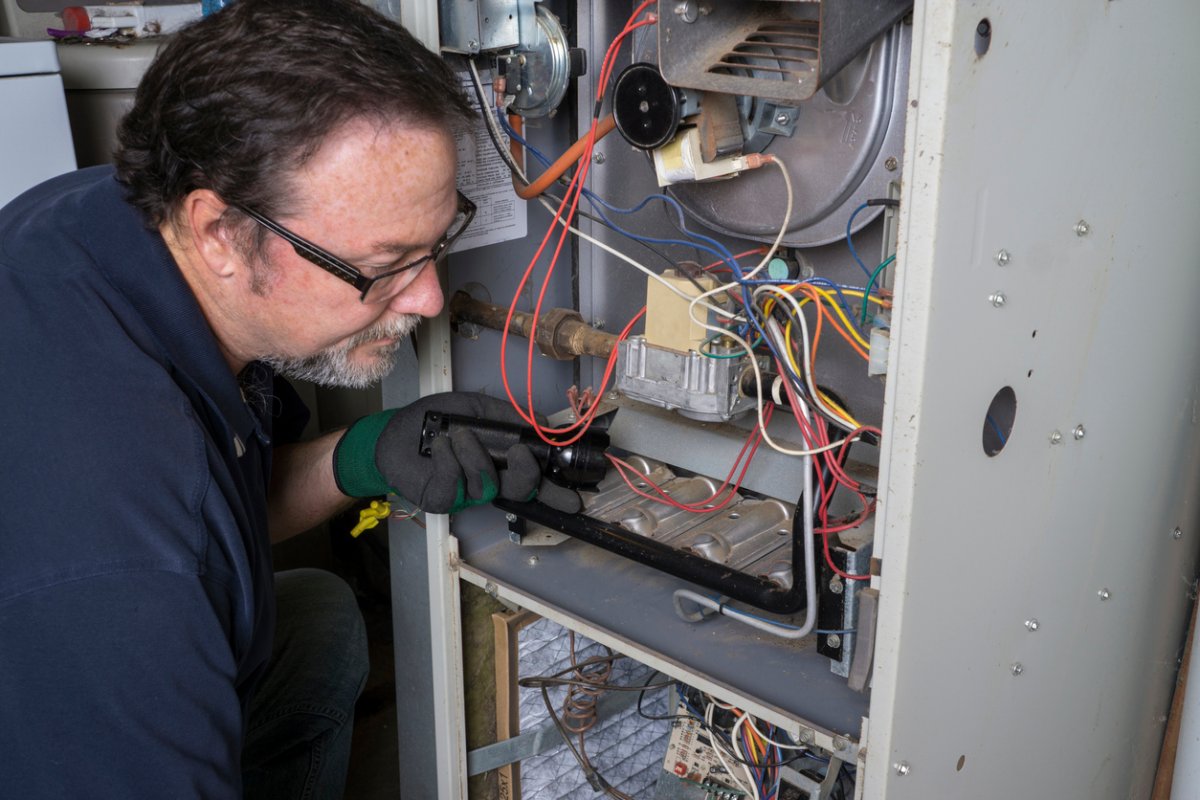

We may earn revenue from the products available on this page and participate in affiliate programs. Learn More ›
Don’t wait until temperatures plummet: Now is the absolute best time to perform basic furnace cleaning and maintenance. By tuning up your heating appliance, you can save the time and money that might have had to go into addressing a crisis, and avoid the inconvenience (and downright danger) of leaving your family without heat during the coldest part of the year.
Performing these very basic furnace cleaning and maintenance tasks also can actually prolong the life of your furnace and coax it into operating at maximum energy efficiency. Follow these steps now to know how to clean a furnace and keep the unit in tip-top shape through the winter.
Before you tackle any furnace cleaning, make sure to have the following equipment and materials at the ready:
Tools & Materials
Bobvila.com may earn a commission from purchases made through these links.
- Foil tape
- Furnace filter (be sure it’s the right size for your furnace)
- Replacement oil filter (for oil-fueled furnaces)
- Lubricating oil (lightweight machine oil)
Recommended Frequency of Furnace Cleaning and Maintenance
The furnace is usually the only thing standing between bitter winter weather and your family’s safety and comfort, and it benefits from an annual inspection and maintenance routine. Proper care and maintenance also will help prolong the life of your furnace, and keep it running at peak efficiency. It’s recommended to clean and maintain your furnace every year, prior to the onset of cooler weather. It also is a good idea to perform a quick clean in the spring, vacuuming up any dust or soot.
However, the furnace filter needs to be inspected and replaced more frequently. How often a filter needs to be changed depends on the use, type of filter, and whether there are pets at home.
- If you use a basic fiberglass or paper furnace filter, it usually needs to be replaced every 1 to 2 months during the heating season.
- If you are using an electrostatic or HEPA filter, plan to change or clean it every 2 to 4 months.
- If your home has multiple furry pets or smokers, you may need to change the filters more frequently to trap dust, dirt, and airborne particulates.
Changing or cleaning furnace filters is perhaps the quickest and easiest way to maximize the efficiency of your heating system. Plus, a clean furnace with a fresh filter can help freshen your indoor air.
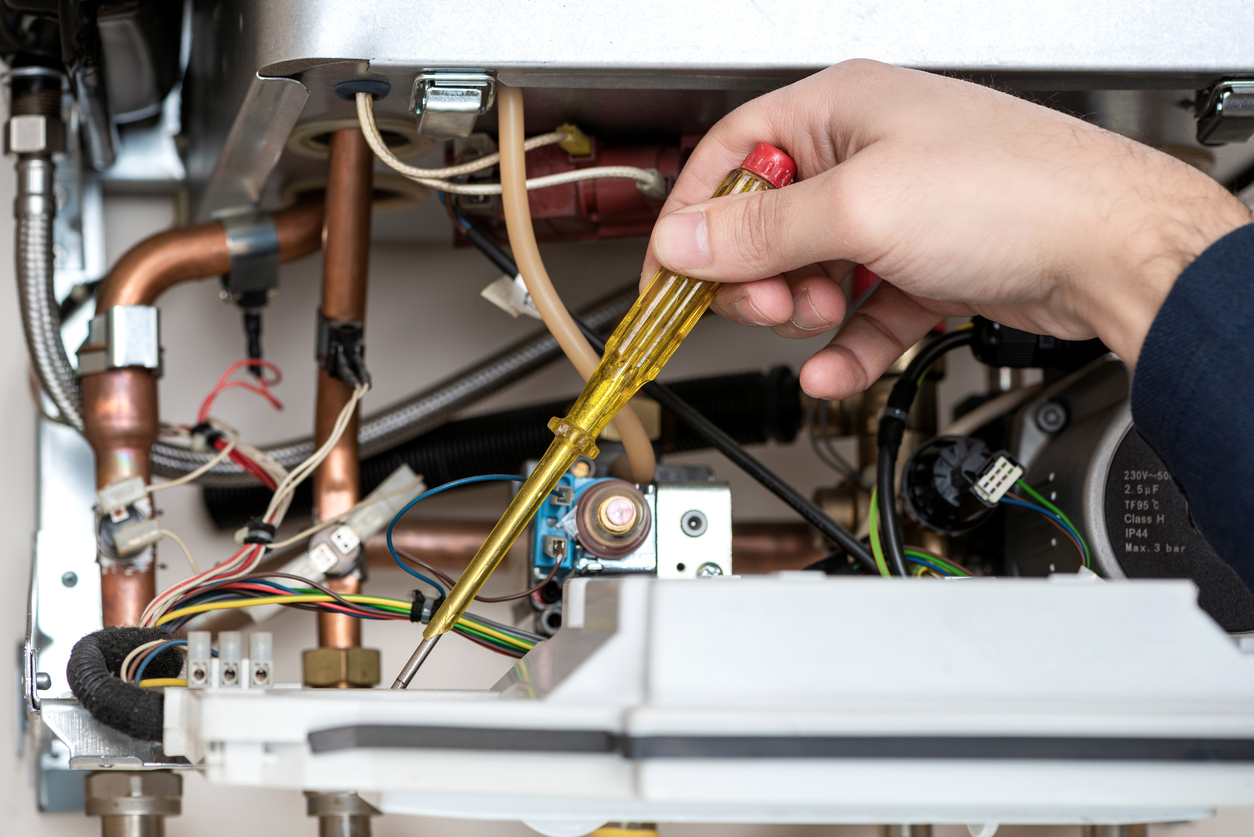
How to Clean and Maintain a Furnace
Most common furnace maintenance is not complicated—you just have to have a good vacuum cleaner and some basic tools and supplies. However, there are a few precautions that are necessary before you begin.
- Always turn off the electrical power and fuel supply before you start any furnace project.
- Keep an assortment of tools and spare parts near your furnace – including the proper screwdrivers (regular or Philips head) to remove the door to the combustion chamber.
- Keep a supply of furnace filters, a replacement oil filter, foil tape for patching small holes in the combustion chamber, flue or ductwork, and good quality machine oil for lubrication on hand.
STEP 1: Clean out the combustion chamber.
Before doing anything else, cut both the electrical power and fuel supply to the furnace. Accomplish cutting the electrical power by toggling the on-off switch on the unit. To cut off the fuel supply, first find the fuel shutoff valve. Depending on your fuel source—oil or gas—the valve should either be near the oil tank or on the incoming gas pipe.
Next, remove the door to the combustion chamber and proceed to vacuum the interior. Inspect the chamber for holes created by corrosion. If you find any, be sure to cover them with foil tape.
STEP 2: Clear the blower compartment of debris.
Lift off the door to the blower compartment and thoroughly vacuum inside. Just as you did in the combustion chamber, look here—and in the exhaust flue—for holes. Cover any holes with foil tape before replacing the door. Perform the same inspection on all ductwork, including the return air ducts. Patch any holes.
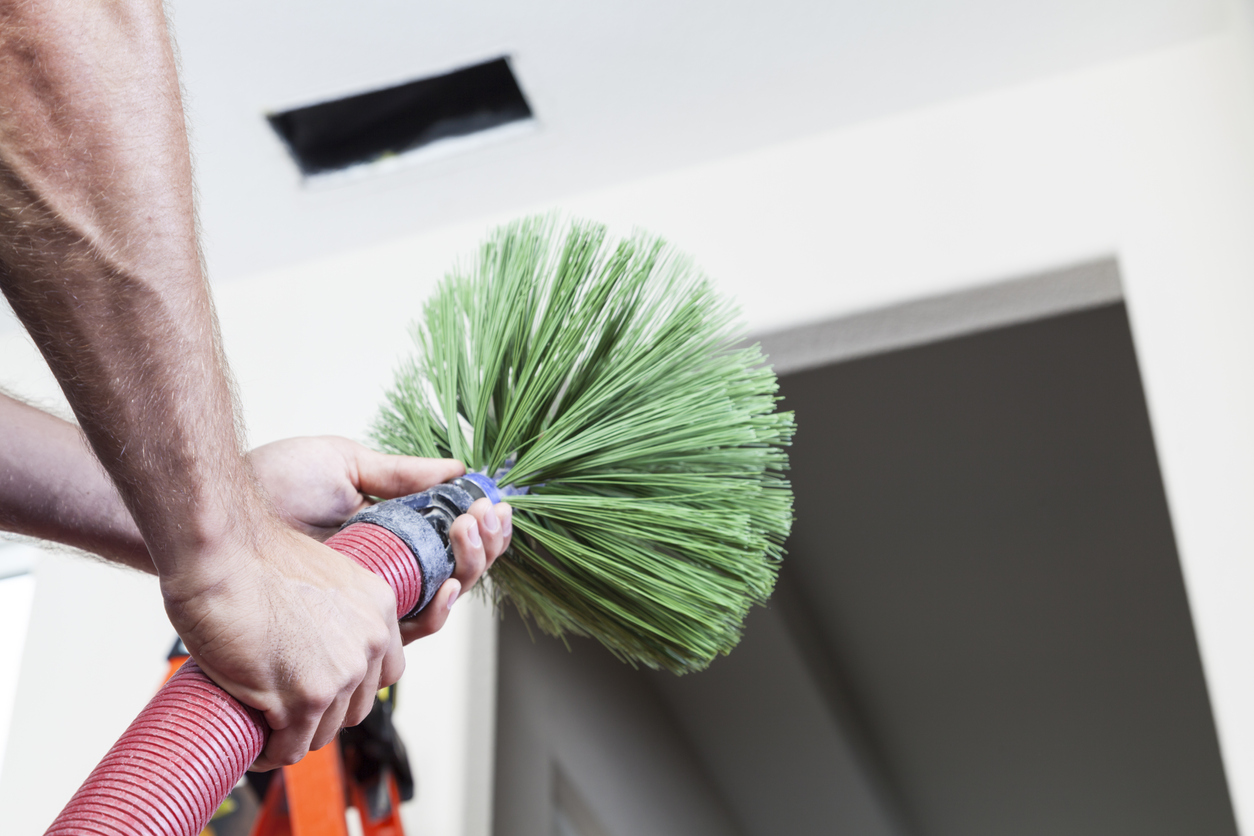
STEP 3: Clean the furnace filter.
Basic furnace filters are designed to trap dust, dirt, and airborne particulates before they can enter the furnace and potentially damage its components. During the heating season, clean or replace the furnace filter every 1 to 3 months (some filters can be cleaned, while others can’t).
Because today’s homes are so tightly sealed, most indoor air circulates through the HVAC system. For that reason, it’s generally worthwhile to spend a bit more on a furnace filter that not only protects the appliance itself, but also enhances air quality by trapping bacteria and pollen as well as mildew and mold spores. If yours is an oil-fired furnace, remember to replace the oil filter as well as the air filter. The oil filter usually needs to be replaced annually.
STEP 4: Oil the motor bearings.
Many older furnaces have two motor bearings and two blower-shaft bearings. Both sets need to be oiled at least once per year. Start by using a clean cloth to wipe the caps over the bearings.
Next, remove the caps and apply two or three drops of lightweight machine oil to each bearing, being careful not to over lubricate. Finish by restoring the caps to their original positions.
When is it Time to Hire a Pro?
Although basic furnace maintenance can be handled by most homeowners, it makes sense to hire a professional for some tasks. For example, if you’ve noticed the furnace rumbling and can’t figure out why. Any of the below situations usually call for a consultation with a HVAC pro.
- Excessive soot: If in the course of cleaning the combustion chamber you notice that an excessive amount of soot has accumulated—which usually indicates that the burners need adjustment or that the heat exchanger must be replaced—call in a pro to diagnose and fix the problem.
- Irregular flame: The pilot light flame should be blue, not yellow. If yours is faint or irregular, it can be a sign of dirty burners or a cracked heat exchanger. Again, hire a pro to diagnose and fix the problem. The hazards involved make such work ill-advised for do-it-yourselfers.
- Short cycling: Is your furnace running for a short period of time only to shut off suddenly? That’s known as “short cycling” and may be caused by an out-of-whack thermostat or an overheating exchanger. Retain the services of a pro to investigate and solve the problem.
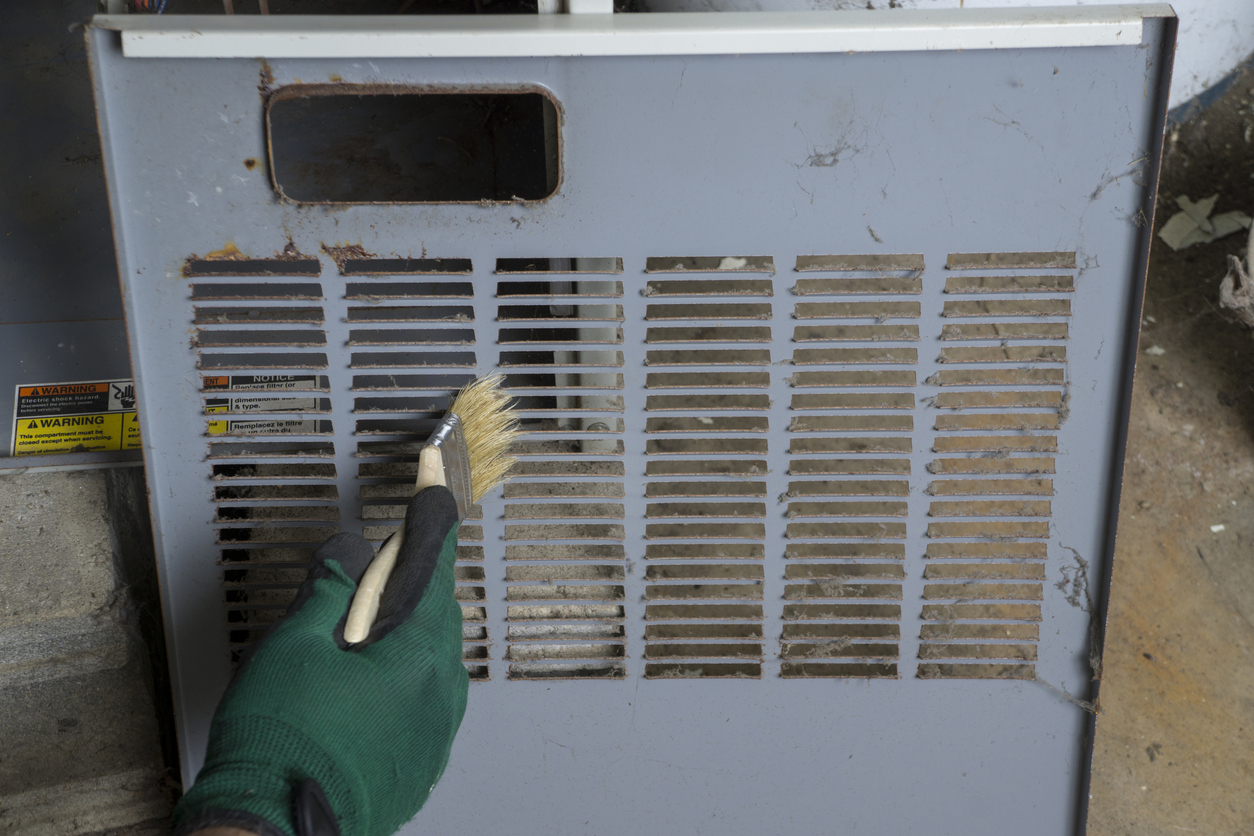
FAQs About Cleaning a Furnace
Many people don’t really think about their furnace much until they experience furnace problems. As with numerous other home appliances, a little bit of regular cleaning and maintenance can go a long way towards ensuring that your furnace is running smoothly and at peak efficiency. Consider regular furnace cleaning and maintenance similar to a tune-up on your car. It’s a necessary part of your routine. Here are a few things to consider when thinking about your furnace.
Q. How long does it take to clean a furnace?
Cleaning, changing filters, and lubricating your furnace are fairly simple steps in a process that really doesn’t take all that long. For a first-timer, it might take a few hours, since you might be dealing with unfamiliar equipment. After you have done it a few times, however, a full furnace clean should only take 1 to 2 hours. Changing the filters is even faster, and it only takes about 2 minutes to ensure that your air is clean and filtered.
Q. How do you know if your furnace is dying?
There are some clear and present warning signs that indicate your furnace may need to be replaced. The most obvious one is age. If your furnace is more than 15 years old, there are much more efficient models available that can save you money on your heating bills.
Some other signs that you might need a new furnace are: excessive noise, rattles, buzzes or hums; large quantities of dust, soot, dirt, or rust particles; cracks or corrosion of the unit; if your energy bills keep going up with the same usage; if some rooms are hotter or colder than others; if the furnace is cycling on and off more frequently; excessive humidity in your home; and if your furnace is stopping or breaking down and requiring much more frequent repairs.
Q. How long does a house furnace last?
Most people inherit a furnace when they purchase their home, and sometimes may not know the age of the unit. Today’s furnaces are fairly long-lasting, and can typically last 20 to 30 years. However, newer furnaces are more energy-efficient, so if your unit is more than 15 years old, you may want to start shopping for a replacement.
A new Energy Star-certified gas furnace will be up to 15 percent more energy efficient than baseline models and can save up to $85 a year in energy costs. An Energy Star-certified oil furnace is up to 4 percent more energy efficient than baseline models and can save up to $75 in energy costs per year, according to the Energy Star website. Homeowners with aging furnaces may also want to consider purchasing a home warranty to help pay for repairs or even an eventual replacement. Some of the best home warranties for plumbing like American Home Shield and Choice Home Warranty offer policies that can cover repair and replacement costs—and in some cases, free or discounted HVAC tune-ups to extend the life of a furnace.
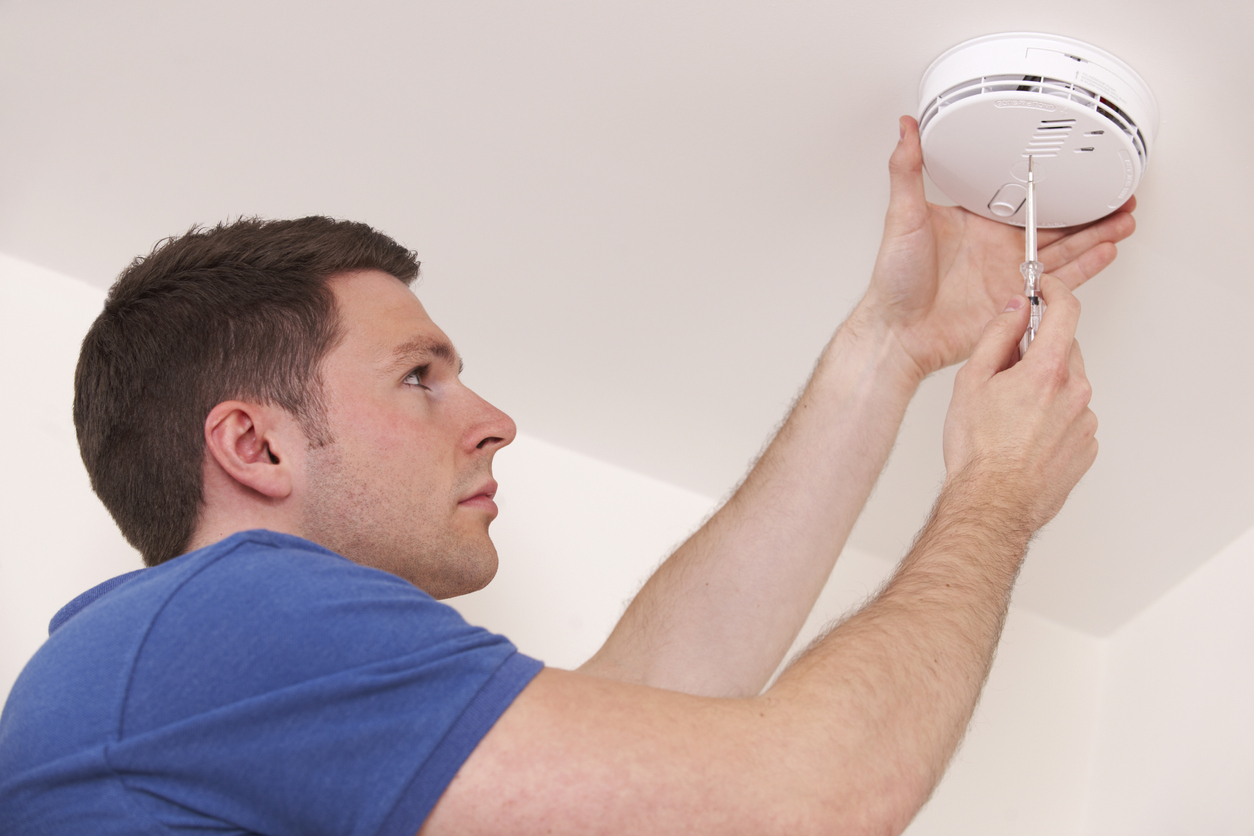
Q. Are old furnaces dangerous?
An older furnace that has been properly maintained generally poses no danger. However, any furnace that has not been properly cleaned and maintained on an annual basis can create a hazardous situation. Some of the problems that can arise include: allergies, aggravated asthma and breathing problems, typically caused by inadequate filtration; gas or oil leaks, which create a fire hazard; and carbon monoxide leaks, which can be extremely dangerous, causing unconsciousness or death.
You should install carbon monoxide detectors on every floor of your home, or purchase integrated smoke and carbon monoxide detectors. Also, regularly check your furnace pilot light – it should burn blue. If your pilot light is yellow, it means that the fuel is not burning cleanly and you should check for carbon monoxide leaks and have your furnace professionally serviced immediately.
Final Thoughts
Your furnace is a major investment in your home and in your family’s comfort and safety. Regular cleaning and maintenance can save you money in the long run, because it will maximize the effective lifespan of your unit. Whether you are looking to maximize the efficiency and performance of a new or existing unit, just a couple of hours of cleaning and maintenance every year will help keep your investment in tip-top shape, while at the same time it can keep you and your family comfy and cozy during the colder winter months.
